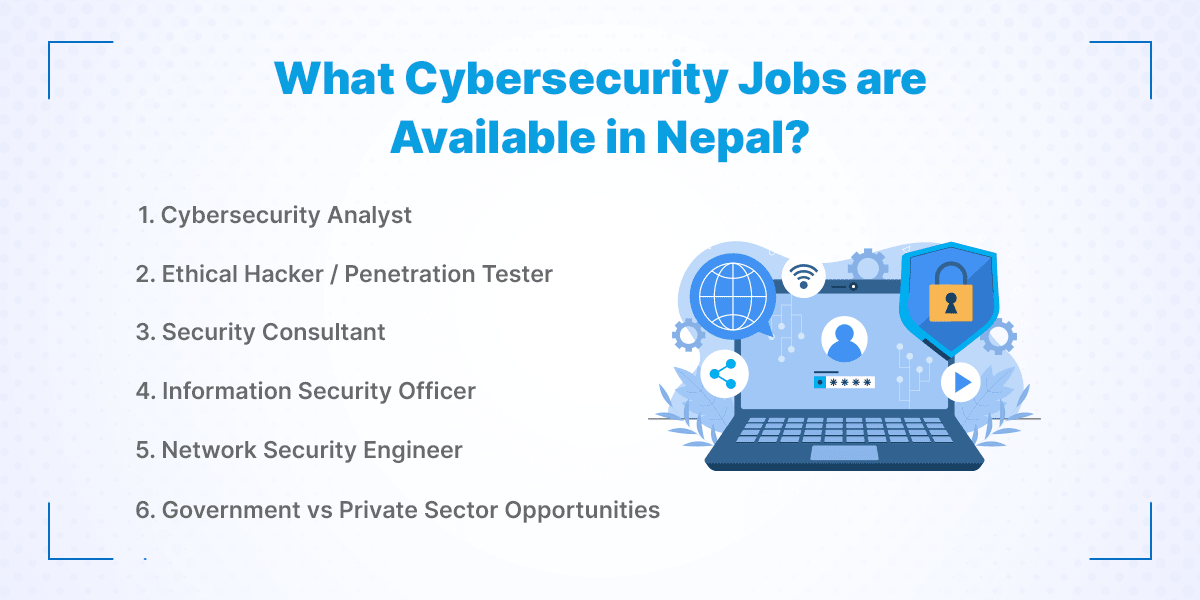
As Nepal is undergoing a fast digital transformation, the risk of cybercrime is also increasing at the same speed. From database attacks to phishing, most sectors are increasingly vulnerable to cyberattacks. This emerging threat has made cybersecurity not just a technical concern but a national priority. Businesses, banks, and government departments seek skilled professionals who can safeguard their online infrastructure and sensitive information.
In this guide, we will explore the existing scenario of cybersecurity in Nepal, exploring the rising demand, job opportunities, desired skills, salary expectations, and long-term career scope. Whether you are a student, an IT professional, or thinking of shifting careers, this blog will help you discover opportunities in one of Nepal’s most critical and emerging industries.
In this blog
What is Cybersecurity and Why Does it Matter in Nepal?
Cybersecurity refers to the protection of computers, mobile phones, websites, and networks from harmful attacks by hackers or viruses. It involves protecting personal data, passwords, banking details, and business data from people who would want to steal, destroy, or manipulate them. Simply, cybersecurity is like a computer lock that safeguards your digital world.
Cybersecurity is becoming more important in Nepal every day. Most of the companies, government offices, schools, and banks now use digital systems for data storage and daily operations. Without security, it is easy for such data to be hacked. Nepal's information security is thus an emerging concern for both the public and private sectors. Just as we lock our homes to stay safe, we now need strong digital defenses to guard our online lives.
Over the last couple of years, cyber attacks in Nepal have increased exponentially. Phishing with emails, social media account hacking, online banking fraud, and even government websites getting hacked have made everyone aware of the risks. So, companies are investing more in cybersecurity tools and trained personnel. The demand for cybersecurity experts is increasing at a fast pace, and it is turning out to be one of the most promising careers in the country.
Why is There a Growing Demand for Cybersecurity Professionals in Nepal?
Nepal is going digital. More and more people use online banking, mobile wallets, online shopping websites, and digital payment systems on a daily basis. Banks, schools, hospitals, and governmental organizations are all storing valuable information on computers and the internet. As a result, the risk of being hacked or scammed online is increasing. To protect their data, these organizations need trained professionals who are aware of how to stop cyberattacks from happening. This is one of the biggest reasons why the cybersecurity demand in Nepal is growing so fast.
Despite the growing demand, there are not enough trained cybersecurity professionals in Nepal. Most of the organizations are not getting professionals who have deep knowledge about network security, ethical hacking, malware protection, etc. Those who are trained in these areas are either overworking or receiving job offers from abroad. The shortage of skilled professionals has turned this industry into a gapped market, and therefore, cybersecurity is one of the most high-paying career options in Nepal currently.
Global trend is yet another important reason that contributes to the rise of cybersecurity in Nepal. It has become a top priority all over the world, and Nepal is no exception. More Nepali businesses are connecting with the global market and adapting international technology. Many foreign companies are also outsourcing cybersecurity activities to Nepal, increasing the job opportunities in this field. This growing connection between foreign demand and local resources is driving the sector forward and creating long-term career prospects in the country.
Types of Cybersecurity You Must Know
Understanding the main areas of cybersecurity helps you learn what skills are needed in this field. Each domain works together to protect systems, data, and networks from attacks. Here are the most important types explained in simple words.
1. Network Security
Network security protects computer networks from hackers, malware, and any unwanted access. It uses tools like firewalls, antivirus software, intrusion detection systems, and secure routers. The goal is to keep the network safe, stable, and free from disruptions. This domain focuses on blocking attacks before they enter the system and making sure only trusted users can connect.
2. Application Security
Application security keeps apps and software safe from threats. It includes testing apps for weak points, fixing bugs, and adding security rules inside the software. This helps protect sensitive data that users enter into websites or mobile apps. Strong app security reduces the risk of hackers breaking into systems through software flaws.
3. Information Security
Information security protects data when it is stored and when it is being transferred. It focuses on confidentiality, accuracy, and availability of information. Tools like encryption, passwords, access control, and secure storage are used. The main aim is to prevent data leaks, data loss, or unauthorized access.
4. Disaster Recovery and Business Continuity
Disaster recovery explains how an organization recovers after a cyber attack, system failure, or major incident. It includes steps to restore data, repair systems, and return to normal operations. Business continuity focuses on keeping essential services running even during the disaster. Together, they help an organization stay stable, reduce damage, and get back to full operation quickly.
5. Identity and Access Management
Identity and access management controls who can access information inside a company. It uses passwords, authentication, login rules, and permission systems. Only verified users can open certain files, tools, or parts of the network. This reduces the chance of misuse, data theft, or internal threats.
6. Cloud Security
Cloud security protects data, apps, and resources stored in the cloud. It includes access control, encryption, firewalls, monitoring tools, and safe cloud settings. The goal is to stop unauthorized access and keep information safe in public, private, or hybrid cloud environments. Good cloud security helps businesses use cloud services without risk.
7. Endpoint Security
Endpoint security protects devices like laptops, phones, desktops, and servers. These devices are common attack points, so they need strong protection. Antivirus tools, device monitoring, and secure configurations help prevent malware or hacking attempts. This domain ensures every device connected to the network stays safe.
8. Mobile Security
Mobile security focuses on keeping smartphones and tablets safe from threats. It includes app permissions, secure mobile networks, mobile antivirus, and safe browsing rules. Since many people work from phones, mobile security is now a major part of cybersecurity.
What Cybersecurity Jobs are Available in Nepal?
Nepal’s digital growth has created a high demand for skilled cybersecurity professionals like cybersecurity analysts, ethical hackers, network security engineers, security consultants, etc. Most of these jobs are available in banks, IT companies, government agencies, and other industries. Here is a brief overview of these careers, their future, and their salaries.

1. Cybersecurity Analyst
A cybersecurity analyst is someone who protects a company's computer systems from cyberattacks. They monitor networks, detect vulnerabilities, and resolve problems before hackers can take advantage of them. Cybersecurity analysts are in great demand at banks, IT companies, and online startups. Almost every medium-sized to large company in Nepal needs this role. They must have knowledge of firewalls, antivirus software, network traffic analysis, and basic scripting (like Python).
2. Ethical Hacker / Penetration Tester
An ethical hacker is someone who breaks into systems legally for a good reason. Their job is to test the security of a system by attempting to break it. Ethical hacking is gaining popularity in Nepal, with a growing demand in the telecom, banking, and cybersecurity sectors. A proper understanding of networks, programming languages (Python, Java), operating systems (Linux), and tools like Kali Linux and Metasploit is a must to become an ethical hacker in Nepal.
3. Security Consultant
A security consultant advises businesses on how to protect systems. They perform risk analysis and help to design secure networks and software systems. Security consultants are mostly required in big companies or projects involving sensitive data, e.g., banks, healthcare, or government systems. To become a consultant, you must have a complete understanding of cybersecurity policies, compliance regulations, and business risk management.
4. Information Security Officer
An Information Security Officer (ISO) is responsible for the overall security of online information in a company. They develop security policies and ensure that the employees comply with them. Most banks and multinational companies operating in Nepal require a full-time ISO. These security officers have a great knowledge of compliance (for example, ISO 27001), data protection laws, internal audits, and team leadership.
5. Network Security Engineer
A network security engineer makes sure that the company's internet and internal network systems are secure. They implement firewalls, monitor the traffic, and block unauthorized access. They are needed in almost all organizations that are dependent on internal networks, especially ISPs, data centers, and large enterprises. To become a certified network security engineer, you should have networking certifications (CCNA, CCNP) and knowledge of firewall management, intrusion detection systems (IDS/IPS), and VPN setups.
6. Government vs Private Sector Opportunities
In Nepal, government jobs in cybersecurity are mostly found in departments like the Ministry of Communication and the Nepal Police's Cyber Bureau. These positions offer job security, fixed working hours, and long-term incentives like pensions. However, the hiring process is slow, and promotions take time, which is typically based on experience and rank rather than expertise itself.
In contrast, the private industry offers faster recruitment, higher starting pay, and faster career advancement. IT companies, banks, telecom companies, and startups are actively looking for experienced cybersecurity experts. Although the work may be more intense, it exposes you to newer tools, international practices, and real challenges, perfect for someone who wants to grow quickly in this field.
Skills Required to Build a Career in Cybersecurity in Nepal
You need both technical skills and soft skills to start a career in cybersecurity in Nepal. Start with learning networks, security systems, and get relevant certifications like CEH or CompTIA Security+ to secure a job in this field. Additionally, you need to be a good problem solver and continue learning. Let's look at some of the skills that can build your career in cybersecurity in Nepal.
1. Technical Skills You Need
Cybersecurity is a technical field, so you need to have a strong understanding of computer systems and network systems. Begin with the fundamentals of networking, including how data is transmitted from one system to another. Learn about firewalls, antivirus software, and how to properly set up secure systems. Knowing Linux is also important for most cybersecurity professionals, as it's widely used in security tools and servers.
A little bit of scripting knowledge (Python or Bash) helps you automate tasks and data analysis. You shouldn't be a professional coder, but knowing how to write simple scripts will accelerate your work and make it more efficient.
2. Certifications That Boost Your Career
Having a certification shows that you're a professional and capable. In Nepal, most organizations look for CEH (Certified Ethical Hacker), CompTIA Security+, and CISSP (Certified Information Systems Security Professional). They are well-known internationally and can also provide remote or freelance IT jobs in Nepal.
You can get cybersecurity training in Nepal through local IT colleges or online websites. A few of the well-known courses also include hands-on labs to give you real-world practice with tools like Kali Linux, Wireshark, and Metasploit.
3. Soft Skills That Matter
Technical skills are necessary, but soft skills are equally important. You'll need good problem-solving skills as a cybersecurity professional since you'll have to think like a hacker and prevent attacks from occurring in the first place. You need to be proficient in critical thinking, too. This involves analyzing situations, identifying threats, and making intelligent decisions quickly.
Cybersecurity is always changing, and therefore, continuous learning is a must. New threats arise every day, and staying updated with current trends, tools, and techniques keeps you in front of your game.
How to Start a Career in Cybersecurity in Nepal?
To start a career in cybersecurity in Nepal, you can begin with an IT or computer science degree or diploma. You do not necessarily need to have a formal degree; you can learn it online or through boot camps. There are many people in Nepal starting with basic training and slowly building the needed skills. You need just good knowledge, a little hands-on experience, and patience.

Educational Qualifications (Degrees or Diplomas)
Most of the cybersecurity jobs in Nepal need applicants who have an educational background in Computer Science, Information Technology (IT), or Electronics and Communication. You can take a Bachelor's or Diploma in these programs from universities or colleges.
If you studied Computer Science (CS) or Information Technology (IT) in school, that's perfectly fine. Many jobs in the IT sector prioritize skills over formal degrees. As a result, numerous individuals enter this field by taking short-term technical courses, attending boot camps, or learning online. Ultimately, your skills and certifications are more important than your degree.
Entry-Level vs. Advanced Career Paths
If you are a fresher in the field, you can look for junior roles such as IT support, junior network administrator, or an internship at cybersecurity companies. These jobs will teach you how the systems work and provide hands-on experience. After a few years, you can move to senior roles like ethical hacker, security analyst, or penetration tester.
To advance to these higher courses, you will need to learn some of the tools and gain industry qualifications like CEH (Certified Ethical Hacker), CISSP (Certified Information Systems Security Professional), CISM (Certified Information Security Manager), or CompTIA Security+. With time, you can work on more sensitive systems and even lead cybersecurity teams.
Online Courses and Bootcamps in Nepal
Today, it is possible to learn cybersecurity in Nepal through different mediums, even from home. You can obtain it from local IT training institutes in Kathmandu, Pokhara, or your own town that offer cybersecurity courses in Nepal. They include hands-on labs, project work, and internship support.
You can also learn online from global websites like Coursera, Udemy, EC-Council, and Cybrary. They have beginner to master-level courses, such as learn ethical hacking in Nepal with subtitles and guided practice. In addition, local training centers also offer cybersecurity bootcamps, which are short but intensive, focused on real-world experience.
What is the Average Salary of Cybersecurity Jobs in Nepal?
The average salary for cybersecurity jobs in Nepal ranges between NPR 25,000 for freshers and NPR 150,000 or higher for experienced employees. Your salary depends on your certifications, skill set, experience, and whether you work in the private or government sector.
Entry-Level vs. Experienced Salary
For freshers in cybersecurity, the monthly pay usually ranges between NPR 25,000 and NPR 40,000. These positions normally consist of junior security analysts or IT support staff who perform simple cybersecurity work. With experience and time, your pay can go much higher.
Skilled professionals, such as ethical hackers, cybersecurity consultants, or network security designers, can earn between NPR 70,000 and NPR 150,000 or more per month. Those working for top private companies or multinational corporations earn the highest.
Factors That Affect Salary
Several factors influence Nepalese cybersecurity salaries. Professionals with industry-standard certifications like CEH, CompTIA Security+, or CISSP usually earn better as they show their skills. Experience plays a role as well: the more years, the more complex problems you can resolve, which justifies higher wages.
Where you work also affects. Private companies, like banks, telecoms, and IT businesses, generally pay more than the government sector. And foreign companies or outsourcers operating in Nepal may pay still more. Location also plays a role. Cybersecurity jobs in Kathmandu and the other major cities offer higher-paying jobs than in the smaller towns.
Challenges in the Cybersecurity Sector in Nepal
Nepal’s cybersecurity field is growing very fast, yet it has some challenges and issues that slow down its development. Identifying these problems is very important for someone who is looking forward to this profession. From human resources with poor skills to inadequate laws and limited budgets, cybersecurity in Nepal faces challenges that need to be addressed.
1. Lack of Awareness and Skilled Manpower
Most individuals and organizations in Nepal lack a proper understanding of the importance of cybersecurity. This leads to weak security practices and minimal investment in training. With no skilled cybersecurity professionals, it is challenging to effectively protect data and systems. As a result, businesses remain vulnerable to attack due to the absence of necessary expertise.
2. Weak Regulatory Frameworks
Nepal's current laws and regulations against cybercrime are not strict or clear. The lack of strict legal standards gives cybercriminals confidence to act with less fear of punishment. In the absence of strict rules, organizations continue to delay improving their security mechanisms. The laws must be enforced more strictly to develop a safer online environment.
3. Budget Limitations in Small Organizations
Small businesses and start-ups typically can't invest enough money in cybersecurity. On limited budgets, they are forced to cut corners on other things, leaving their security software exposed. This makes hackers or attackers target the system with ease. Affordable and realistic security solutions are needed in order for these companies to effectively guard themselves.
What is the Scope of Cybersecurity in Nepal?
The scope of the IT sector in Nepal is very high, with growing demand and good career development opportunities. The growth in digital has created a greater demand for skilled cybersecurity professionals. As Nepal undergoes rapid digitalization, more and more people and companies are utilizing online banking, shopping, learning, and communication. This has also increased the risk of cyberattacks like hacking and data breaches. Therefore, companies, banks, schools, and even government offices now need experts to keep their systems secure.
As a result of this growing demand, cybersecurity jobs are increasing in the majority of industries. From entry-level jobs to executive-level positions, there are opportunities for career advancement with experience and certifications. Careers like security analyst, ethical hacker, information security officer, and others are in high demand. Cybersecurity is no longer just an IT career; it is now at the heart of every modern organization.
The government and private sectors in Nepal are also encouraging this industry. New policies on cybersecurity are being launched, and training centers are offering professional courses. As digital development continues, the future of cybersecurity in Nepal is strong, stable, and promising for anyone who wishes to become a cybersecurity professional.
Conclusion
Cybersecurity is evolving into one of Nepal's most critical and rapidly growing professions. With more services moving online, the requirement to protect data and systems is generating strong job demand with decent income and career development.
If you are a student or working professional who has an interest in technology, this is the perfect time to start learning cybersecurity. Many training centers and online websites provide beginner to expert courses here in Nepal.
Want to explore other creative tech fields too? If you're looking for cyber security jobs in Nepal, you can explore the latest openings on Kumari Job to find opportunities that match your skills and career goals.











Loading Comments...